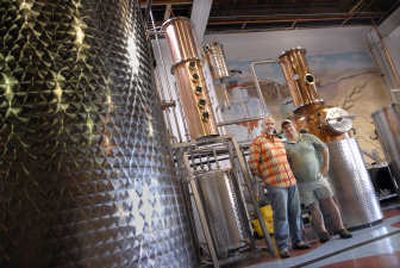Distillery ties up loose ends

The founders of Spokane’s fledging craft distillery have a shiny copper still imported from Germany, pallets of Washington-grown wheat ready to be transformed into high-end spirits and a go-ahead from the federal government.
Though a truck trip to Spokane slightly damaged some of Dry Fly Distilling Inc.’s equipment, distilling could start as early as this week, said co-founder Don Poffenroth.
“We had to kind of MacGyver a couple things around,” Poffenroth said Monday, standing near a towering copper rectification column that will help refine vodka Dry Fly would like to sell for $30 to $32 a bottle.
Although the project is about a month behind schedule because of licensing and equipment delays, Poffenroth said, Dry Fly vodka could appear in liquor stores in mid-October.
Poffenroth and co-founder Kent Fleischmann plan to make pricey vodka, gin and whiskey using mostly local ingredients. They recently obtained federal approval, and Poffenroth boasts Dry Fly will be Washington’s first working distillery since the end of Prohibition.
The state is nearly at the end of its licensing process, pending a letter from the bank backing the operation, said Susan Reams, a spokeswoman for the state Liquor Control Board.
The founders receive a few curious visitors each week to their 3,000-square-foot warehouse at 1003 E. Trent Ave., Suite 200, located next to Northern Lights Brewery Co. The fly-fishing friends have transformed it from a former Cravens Coffee Co. building, painting a river on the floor and hanging a canoe and fly fishing rod near the door. A mural by a local artist covers one wall, depicting an oversized Dry Fly vodka bottle superimposed on a river winding through yellow grain fields.
In one corner, 2,000 glass bottles imported from France and bearing the company’s logo of a red fly lure sit near 20 oak barrels purchased from the parent company of Jack Daniel’s. While vodka and gin only take about seven days to produce, Dry Fly whiskey will be aged for at least two years, Poffenroth said.
State law doesn’t allow Dry Fly to sell bottles on-site or offer public tastings. But the founders hope to change that by working with state Sen. Chris Marr, the Liquor Control Board and other local lawmakers to introduce new legislation this winter.
Marr said the legislation, which he hopes to prefile before the session, would also seek to lower the annual fee for craft distilleries from $2,000 to the amount microbreweries and small wineries pay, currently $100. The legislation could have economic development potential, paving the way for a “cottage industry,” he said.
“There’s no logical reason why we can’t do this,” Marr said.
Although the state controls availability of liquor, Dry Fly expects local liquor stores to request its spirits, Poffenroth said.
While the founders don’t keep set hours at the distillery, people can drop in.
“If we can let you in, we’ll be happy to do so,” Poffenroth said.